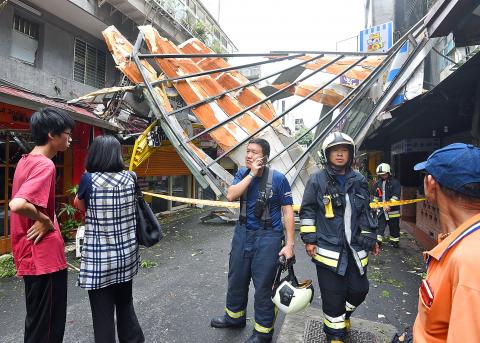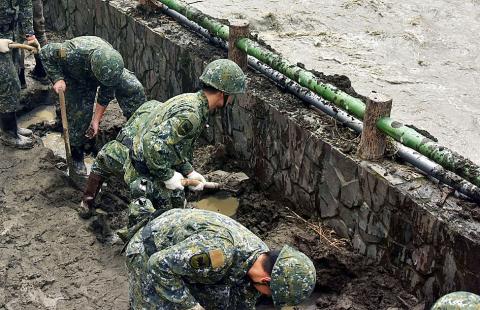More than 600 people were injured by Typhoon Megi, which made landfall on the east coast on Tuesday afternoon.
The Central Weather Bureau (CWB) lifted both land and sea warnings at 5:30pm yesterday after Megi weakened into a tropical storm and landed on China’s Fujian Province.
CWB forecaster Hsieh Ming-chang (謝明昌) said that although the nation was no longer under the storm’s coverage, wind speed in coastal areas still reached level 8 on the Beaufort scale.

Photo: Liao Chen-huei, Taipei Times
Heavy precipitation continued in some southern regions due to lingering clouds from the storm, which should ease today, he said.
He added that a low-pressure system that is about 500km southeast of Taiwan is likely to move toward the nation between tomorrow and Saturday, which could affect the weather in Hualien, Taitung and southern Taiwan, he said.
Meanwhile, Tropical Storm Chaba formed early yesterday morning, which the bureau forecast would move near Okinawa, Japan, by Monday.

Photo: CNA
Hsieh said the storm was still about 2,860km from Taiwan.
“We are monitoring the movement of Chaba and the force of the Pacific high-pressure system, which would determine when the storm would turn north and in which direction it would go,” he said.
Statistics from the Central Emergency Operation Center as of 5:30pm yesterday showed that Megi left four people dead and 622 injured in the past two days, with more than 4,000 people remaining in shelters.
A total of 2,402 households were still without water supply.
Telecom service providers said they had mobilized thousands of engineers to repair about 13,000 base stations that were damaged. A total of 5,384 base stations had not resumed normal functions.
As of 9:53pm yesterday, 359,927 households were still without power, state-run Taiwan Power Co (台電) said.
The Taiwan Railways Administration (TRA) and Taiwan High Speed Rail Corp resumed train services yesterday afternoon, although TRA canceled operations of the Alishan Forest Railway, as well as the Pingsi (平溪) and Jiji (集集) branch lines.
More than 750 flights departed from the Taiwan Taoyuan International Airport yesterday, as the nation’s largest airport activated a plan to transport about 12,000 passengers whose flights were canceled on Tuesday.
Statistics from the Civil Aeronautics Administration (CAA) showed that 234 domestic flights and 58 international flights were canceled yesterday.
One domestic and 112 international flights were also delayed.
The agency said that it was investigating whether EVA Air (長榮航空) had violated aviation rules when it dispatched flights on Tuesday. Netizens have accused the nation’s second-largest airline of forcing pilots to land under inclement weather.
The standards that the airline company set to dispatch or land a flight on a typhoon day, as well as the amount of fuel that its airplanes were carrying and the number of hours its cabin crew were working would all be under scrutiny, the CAA said.
EVA had 45 flights that were scheduled to land at the Taoyuan Airport on Tuesday. Thirty flights landed at the airport, including those returning to Taoyuan after first landing in Hong Kong or Okinawa. In addition, seven flights landed in Hong Kong, seven in Taichung and one in Macau, the agency said.
The CAA said the airline is supposed to choose at least two backup airports if its flights could not land at their target destinations.
EVA yesterday issued a statement denying the allegations, adding that it would sue individuals spreading unsubstantiated comments online.

CHAOS: Iranians took to the streets playing celebratory music after reports of Khamenei’s death on Saturday, while mourners also gathered in Tehran yesterday Iranian Supreme Leader Ayatollah Ali Khamenei was killed in a major attack on Iran launched by Israel and the US, throwing the future of the Islamic republic into doubt and raising the risk of regional instability. Iranian state television and the state-run IRNA news agency announced the 86-year-old’s death early yesterday. US President Donald Trump said it gave Iranians their “greatest chance” to “take back” their country. The announcements came after a joint US and Israeli aerial bombardment that targeted Iranian military and governmental sites. Trump said the “heavy and pinpoint bombing” would continue through the week or as long

TRUST: The KMT said it respected the US’ timing and considerations, and hoped it would continue to honor its commitments to helping Taiwan bolster its defenses and deterrence US President Donald Trump is delaying a multibillion-dollar arms sale to Taiwan to ensure his visit to Beijing is successful, a New York Times report said. The weapons sales package has stalled in the US Department of State, the report said, citing US officials it did not identify. The White House has told agencies not to push forward ahead of Trump’s meeting with Chinese President Xi Jinping (習近平), it said. The two last month held a phone call to discuss trade and geopolitical flashpoints ahead of the summit. Xi raised the Taiwan issue and urged the US to handle arms sales to

BIG SPENDERS: Foreign investors bought the most Taiwan equities since 2005, signaling confidence that an AI boom would continue to benefit chipmakers Taiwan Semiconductor Manufacturing Co’s (TSMC, 台積電) market capitalization swelled to US$2 trillion for the first time following a 4.25 percent rally in its American depositary receipts (ADR) overnight, putting the world’s biggest contract chipmaker sixth on the list of the world’s biggest companies by market capitalization, just behind Amazon.com Inc. The site CompaniesMarketcap.com ranked TSMC ahead of Saudi Aramco and Meta Platforms Inc. The Taiwanese company’s ADRs on Tuesday surged to US$385.75 on the New York Stock Exchange, as strong demand for artificial intelligence (AI) applications led to chip supply constraints and boost revenue growth to record-breaking levels. Each TSMC ADR represents

State-run CPC Corp, Taiwan (CPC, 台灣中油) yesterday said that it had confirmed on Saturday night with its liquefied natural gas (LNG) and crude oil suppliers that shipments are proceeding as scheduled and that domestic supplies remain unaffected. The CPC yesterday announced the gasoline and diesel prices will rise by NT$0.2 and NT$0.4 per liter, respectively, starting Monday, citing Middle East tensions and blizzards in the eastern United States. CPC also iterated it has been reducing the proportion of crude oil imports from the Middle East and diversifying its supply sources in the past few years in response to geopolitical risks, expanding